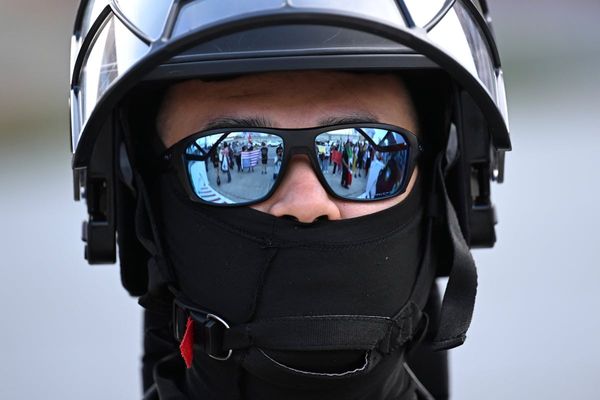
A tremendous theatrical week culminated in the year’s most powerful play: a drama of “the de-Industrial Revolution”. Lynn Nottage’s Sweat, written in the wake of recession, is based on years the playwright spent in Reading, Pennsylvania: in 2011, Reading was the poorest city of its size in the United States. Talking to steel workers locked out of the factory where they had worked for decades, Nottage found people who talked of their city in the past tense, friends whose lifelong affection had begun to fracture, sudden tensions between black and white workers. She heard the anger that brought Trump to power. And she brought all this to the stage. Unforgettably.
What a piec e of work Sweat is: buzzing with documentary truth and dramatic vivacity. This important production also has a particular significance for the UK stage: its director, Lynette Linton, is the new head of the Bush theatre, such a generator of new plays in London.
Frankie Bradshaw’s design is first monumental and decrepit, then bright and detailed. An industrial wasteland – rusty pipes the breadth of human torsos – gives way to a bright bar with a neon sign in cursive writing, plastic tomatoes for ketchup. Nottage’s themes are fundamental: the vital importance of work (a hard-nosed woman lyrically recalls the carvings of her German grandfather); the corrosive effects of poverty; the waning power of unions; the way hardship ignites a sense of difference – causing men to turn against women, white against black. Yet the main experience of Sweat is immediate, particular. And sheerly exciting. This is the first play in which a fellow critic has gripped my elbow in terror. Rightly. What a terrifying baseball-bat moment: a horrible episode, so skilfully choreographed by the great fight director Kate Waters that an unnecessary event looks inevitable – and leads to the mutilation of three lives.
Summarise the characters and they make an American tapestry: the Vietnam vet; the angry white boy who gives himself a new face with tattoos; the woman who once had Joni Mitchell hair. Yet Sweat never feels like character tourism: Nottage gives everyone a rich history and a biting idiom. Which are fully embodied by an exemplary cast: performance is too strutting a word for what they offer. Martha Plimpton – straddling legs, face that bunches and opens up, a woman whose entire life gets trashed – is a marvel of stalwart disappointment. Clare Perkins, the woman who gets dissed for being a token black appointee, is a beacon: ferocious, steady, beset. As her son, Osy Ikhile brings blazing intelligence on to the stage. How terrible and inspiring to watch vibrant lives being shredded – and rising up.

At the Young Vic, The Convert also sizzles with disclosure. Danai – Okoye in Black Panther – Gurira’s historical play, written in 2012, feels absolutely of the moment. In 19th-century Rhodesia a young Shona-speaking woman is rescued from a forced marriage by an earnest black Roman Catholic missionary. The price of that freedom is the abandonment of her former beliefs and her heart, in the shape of her family. It’s a devastating dilemma, finely dissected and fully dramatised, with vigorous action, meditative moments and continual surprises of characterisation.
The play’s qualities were evident last year in Christopher Haydon’s Gate production, with an erupting design by Rosie Elnile and a rapt central performance by Mimi Ndiweni – why haven’t I been seeing her all the time since? Ola Ince’s larger staging is wonderfully ample and far-reaching. Naomi Dawson’s design makes the missionary’s security look provisional, its sofa and desk perched in the middle of an unseen body of white people, and villagers routinely referred to as barbarians. The audience, surrounding the stage, are part of the pressures. Their interaction is sometimes like a benign boxing match; applause breaks out when Letitia Wright proclaims her Shona – not her imposed Catholic – name.

Wright is extraordinary. With arms spread wide, she glides into her new life like a kite on winds of change; gradually she becomes more constrained, as if the frills of her frock were corsets. As her employer, beautifully judged Paapa Essiedu is buttoned up and pernickety, slipping into tiny errors – “bees in the bonnet” – as he tries to please. There is a lovely turn from Luyanda Unati Lewis-Nyawo as a provocative, pipe-smoking Portia – and a shrewd study of justified disdain from Pamela Nomvete. The arguments are finely calibrated. The beauty of belief is seen in the glow of Bruno Poet’s lighting as Wright is outlined in front of a large crucifix. But by the end of the play that crucifix has vanished, along with the hope of Christian loving kindness.
Pared down, spoken at speed, contained in a cell, Joe Hill- Gibbins’s production of The Tragedy of King Richard the Second is a compressed, hurtling take on Shakespeare’s portrait of a disintegrating monarch. From the beginning the text is turned on its head to focus on the head of state. Instead of the deferential genealogical rumble – “Old John of Gaunt” – this staging goes to the end, to Richard’s celebrated comparison of his prison cell and the world.
This transports you into the core psychology of the play – the loneliness of a king who imagines the loneliness of everyone. It illuminates the theatricality of the action: “thus play I in one person many people”. It focuses on the magnet that is Simon Russell Beale.

Given his gift for radiant complexity, and given the way Richard II swims in reflections – mental and actual – I was expecting an evening of velleities and melancholy. But this supreme Shakespearean is more serpentine. Drawing on another gift, his penetrating humour, Russell Beale throws lines up into the air to quiz them, and repeats adverbs like a tutor sneering at a student’s essay. He is petulant, mischievous and eventually desolating: he is never, as Richard can be, feeble.
Leo Bill flickers into life as a wary, one-eye-over-his-shoulder Bolingbroke, not so much a schemer as someone making it up as he goes along. For the most part the cast are dramatised factions. Huddling like cronies, they scuttle in grey and dun, speaking with a choric intensity, flapping into playground competitiveness. There are overstated moments – a prominent bucket marked “blood” – but few overstated themes. The contemporary resonance speaks for itself: a weak leader, a chaotic nation – and a land choked with caterpillars.
Star ratings (out of five)
Sweat ★★★★★
The Convert ★★★★
The Tragedy of King Richard the Second ★★★★
Sweat is at the Donmar Warehouse, London, until 26 January
The Convert is at the Young Vic, London, until 26 January
The Tragedy of King Richard the Second is at the Almeida, London, until 2 February







